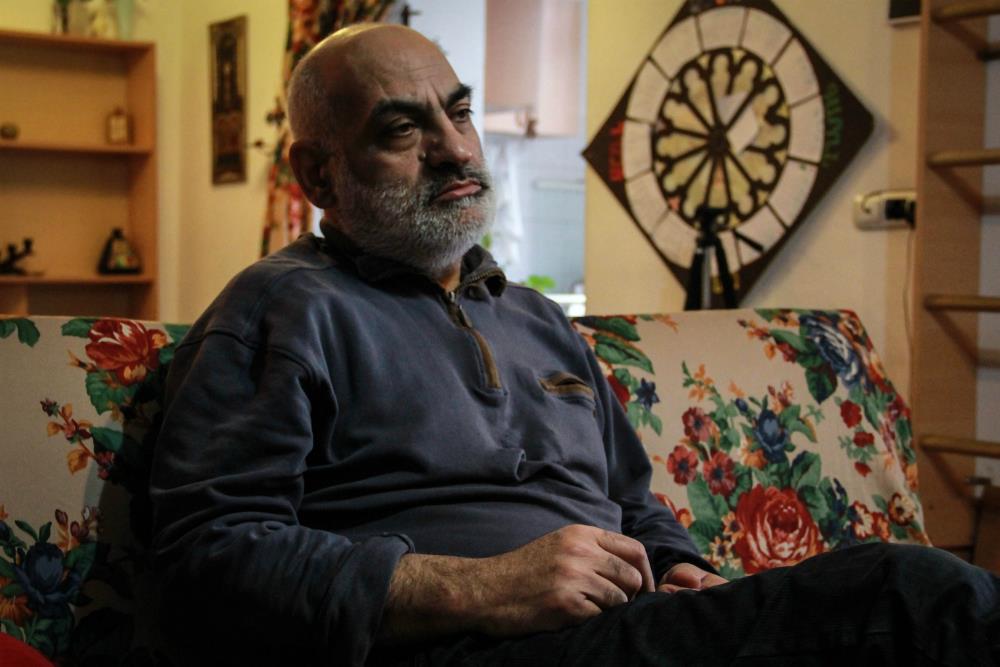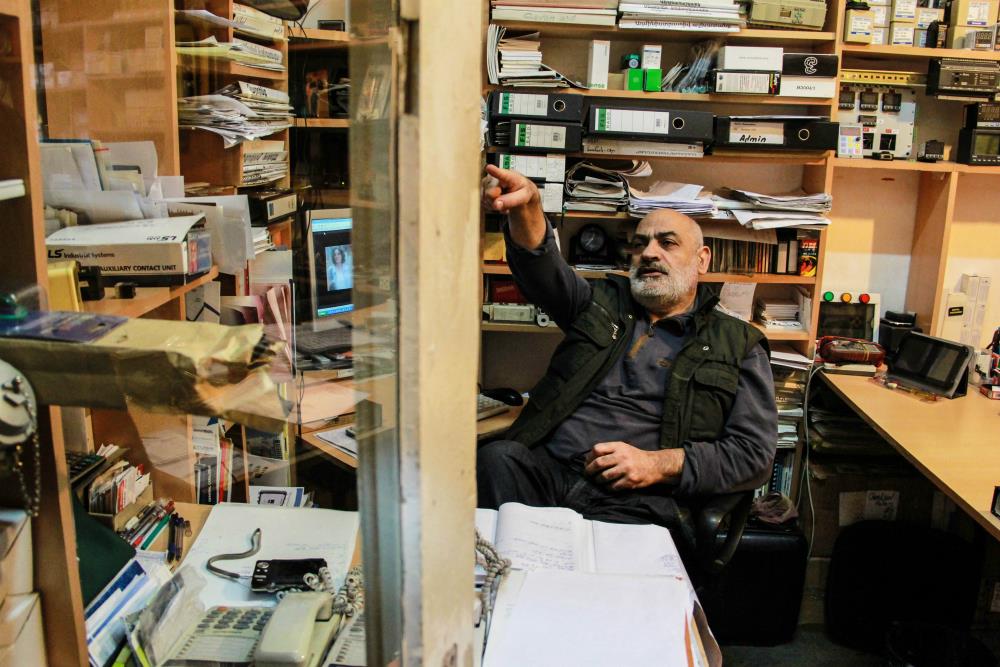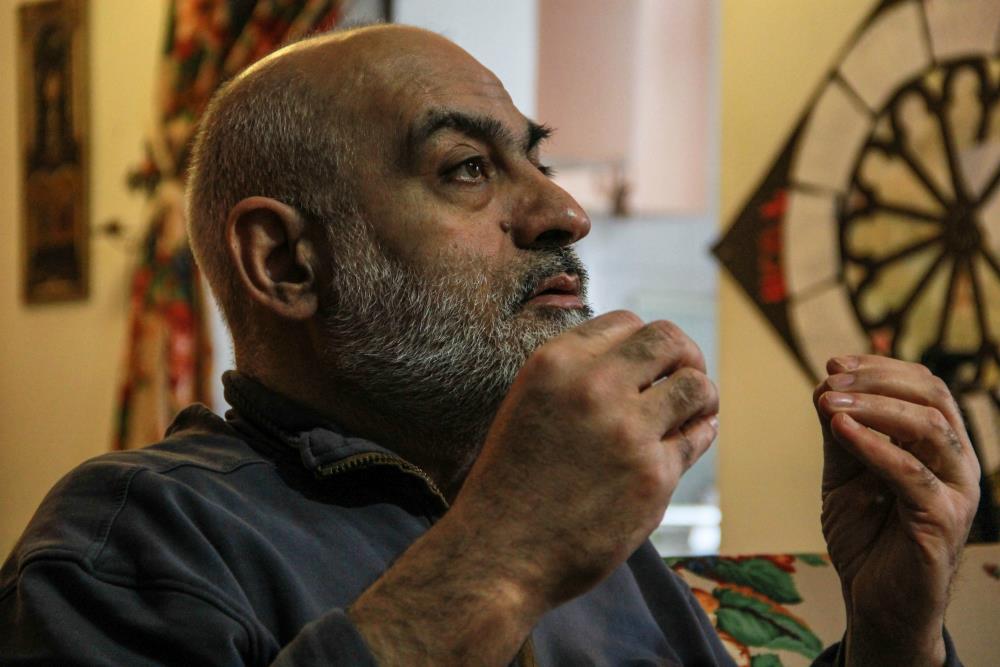Political prisoners by definition
On liberty
Vardges Gaspari, an activist, spent about eight days in the “Nubarashen penitentiary facility and then got back to his ordinary life. Every morning he takes a stroll with his 12 year-old son in the “Lovers’ Park, which is located in the vicinity of the National Assembly. It was here that he, from time to time, expressed his attitude towards the judicial system and how justice is carried out in Armenia. Gaspari’s protest is sort of a rally–he peacefully lies down on the ground.
Vardges Gaspari is one of the people who was placed in the penitentiary facility for civil disobedience. Therefore, some people in political circles regard the civil activists in custody, as well as already released Vardges Gaspari, as political prisoners. Others claim these persons have nothing to do with the typical idea of a “political prisoner.

Here is what Vardges Gaspari, himself, thinks about all this:
“Frankly speaking, I do not consider myself to be a political prisoner. It’s not to say because politics are a dangerous and dirty matter, but rather because I don’t have a good grasp of politics and I can hardly focus on political issues. First of all, I consider myself to be a citizen, an active citizen, a human rights activist.
The activist adds that his arrest is neither a victory nor a defeat for one side or the other. Vardges Gaspari has been struggling for the independence of the judicial system, the establishment of justice and the rule of law for approximately ten years. Whereas today, he himself, has become one of those who is seeking justice and needs his rights to be protected:
“I’ve been accused of insulting the police, of being in contempt of the court. I have told the police, ‘You are unworthy, dishonorable criminals, murderers; you killed my next of kin.’
This is a well-known fact, at least that was the case on March 1 [the matter concerns the emergency situation following the 2008 presidential elections, when the authorities used force against those, who refused to recognize the results of votes. As a result, 10 people were killed]. Three out of ten victims were killed then by “Cheremukha police weapons. That gave grounds for institution of criminal proceedings. And I don’t back down my words.
Gaspari – a political prisoner or not?
Armenian authorities do not consider Vardges Gaspari to be a political prisoner, noting that he was arrested as part of the criminal proceedings.

“The use of the term-“political prisoner, arrested on political grounds is unacceptable here. Be careful with these expressions. I don’t think that the provisional arrest with regard to Gaspari was linked to his political views.
The court made the decision concerning his arrest in connection to the judicial proceedings, and that does not mean that he was subjected to political persecution, said Hovhannes Sahakyan, Chairman of the Armenian National Assembly’s Standing Commission on State and Legal Affairs.
However, the representatives of the opposition and human rights activists do not share this opinion, claiming that Vardges Gaspari was arrested for his political views. Artur Sakunts, the Head of the Helsinki Citizens’ Assembly Vanadzor Office, noted that none of the governments had ever recognized the existence of political prisoners in the country.
“I think what happened to Gaspari was the result of political persecution and the consequence of his intransigent political protest, he noted.
Levon Zurabyan, the head of the oppositional “Armenian National Congress (ANC) faction, stated that persecution of people for their political views was inadmissible in a state which aspires to become a democracy. “The year began with the jailing of Gevorg Safaryan, then Vardges Gaspari, an activist, was arrested for the organization of protest rallies against the authorities’ arbitrariness.
Present day political prisoners
According to some human rights organizations’ estimates, 18 citizens are serving time for their political views in Armenia at this point in time. 15 of them have gone on trial as part of the “Shant Harutyunyan and Friends case, for their attempt to organize a protest march against membership in the Customs Union, on November 5, 2013.
Volodya Avetisyan, a Karabakh war veteran, who struggled for the rights and dignified life of participants in the war and military servicemen, was also arrested. He was sentenced on the charge of swindling following a number of protest rallies in Liberty Square.
Hayk Kyureghyan, who at a policeman fired from a gas pistol right in front of the court hearing in the “Shant Harutyunyan and Friends case, has been also included in the list. Kyureghyan climbed atop a car and tried to express his protest against the arrest of Shant Harutyunyan and his friends.
Gevorg Safaryan, a “Nor Hayastan movement activist, is also among the list: he was trying to install a fir tree in Liberty Square, but police officers prevented him from doing that. After the incident, he was first detained and later arrested on charges of use of force against a representative of authority.
Who can be regarded as political prisoner?
The Criminal Code of the Republic of Armenia does not provide for a definition of the term “political prisoner.
Contrarily, the Parliamentary Assembly of the Council of Europe (PACE) defines who a political prisoner is. In its definition:
1. A person deprived of his or her personal liberty is to be regarded as a political prisoner if he has been placed in detention in violation of one of the fundamental guarantees set out in the European Convention on Human Rights and its Protocols (ECHR), in particular, the freedom of expression, practicing a religion, freedom to spread information, the freedom of assembly;
2. A person deprived of his or her personal liberty is to be regarded as a political prisoner if he has been placed in detention for purely political reasons without being tried for any offence, and also ‘if the length and conditions of detention are clearly disproportionate to the degree of the offense the person has been found guilty of or is suspected of.’
Video footage of the protest rally by Gaspari’s supporters
As the lawyers of these 18 citizens claim, the aforementioned criteria have been applied to all of them.
However, the Armenian authorities still do not acknowledge that there are political prisoners in the country, acting in a similar fashion to how they did following the developments on March 1, 2008. Shortly thereafter, both President Serzh Sargsayan and Prosecutor General, Gevorg Kostanyan, made statements on the issue. Arpine Hovhannisyan, the Justice Minister, has recently made a similar statement when commenting on the developments around Vardges Gaspari.
In the opinion of Armen Martirosyan, Deputy Chair of the Heritage party, the reasons for this are understandable: the authorities are afraid to damage the country’s international image. At the same time, they cannot allow the citizens, who are unmistakenly aware of their rights, to serve as an example for others:
“A citizen, aware of his/her rights, who is not afraid to fight against injustice, is the most dangerous phenomenon for the incumbent authorities. These people demonstrate that one should not give up on struggle, that it may be effective, that a strong will is required to change the situation, the movement may become “contagious for the broader segments of the population. A few people may not be dangerous to them, but these few may be able to spread their beliefs to many, etc.
The price of justice
Vardges Gaspari’s family supports him, but he notes that the struggle is effort-consuming and is a heavy burden not for him personally, but, in particular, for his family.
“People work from morning till night and cannot solve their financial and welfare problems, especially when one is so actively engaged in public activity. I have no time to tackle my own problems. I was fined 500,000 AMD (over $1,000) during the span of a year and I paid them all.
And that’s given the fact that I even need to think about the money I save on my children’s footwear. I don’t think my family deserves such harsh treatment. Only during the war were people that harsh with regard to their families; they left their wives and children and went to war. I don’t want to continue being so harsh to my family, says Vardges Gaspari.

He now tries to spend more time with his family, especially with his son, in order to make up for lost time. By the way, Gaspari’s 12 year-old son does not go to school for health reasons. He has been having health problems since the age of 3, as a result of undue pressure on the activist’s family on the part of the law-enforcers.
Published: 19.04.2016



















